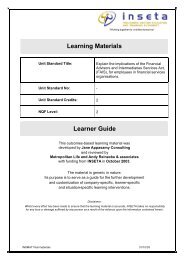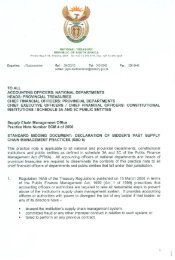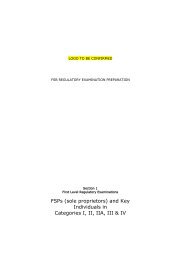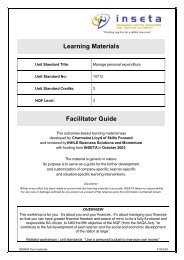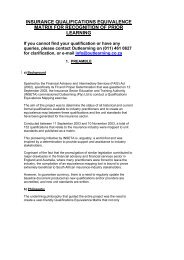SSP Brochure:Layout 1 - INSETA
SSP Brochure:Layout 1 - INSETA
SSP Brochure:Layout 1 - INSETA
You also want an ePaper? Increase the reach of your titles
YUMPU automatically turns print PDFs into web optimized ePapers that Google loves.
4 SCARCE AND CRITICAL SKILLS IDENTIFICATION4.1 Scarce skills (Skills Shortages)“Scarce skills” or “skills shortages” refer to specific occupations that lack sufficient people trained to fill positions available in the labour market.In larger organisations, these shortages often manifest in vacancies that employers cannot fill (“hard-to-fill” positions). However, on occasion,employers may well fill the vacancies, but not with the people that they would ideally like to place in the vacancies.The information on scarce skills presented in this section was derived from a study on scarce skills 61 as well as from interviews withprofessional bodies and associations in the insurance sector.Data on scarce skills needs of the sector were collected by means of two processes. First, the section on scarce skills needs in the WSPsthat were submitted in Year 7 by employers of large organisations (employing more than 50 people) was analysed. Second, a telephonicsurvey was conducted with a sample of employers in the sector that employed fewer than 50 people. The aim of this survey was tocollect information on scarce skills similar to the information that was supplied by organisations that submitted WSPs in Year 7. Employerswere first of all asked about vacancies that they could not fill for a period of three months. They had to list the specific occupations in whichthese hard-to-fill vacancies existed, report on the reasons for the difficulties to fill the positions, indicate the severity of the needs andprovide the number of positions that they tried to fill.Results from the study revealed that 16.6% of the organisations in the sector found it difficult to recruit suitable candidates for vacantpositions. A total of 3 354 posts (3.0% of sector employment) across various occupational categories were listed (Table 4-1). The majority(2 209 or 69.5%) of these posts were for professional occupations. This constitutes 8.0% of the total number of professionals employedin the sector.Nearly a quarter of the positions required trained clerical and administrative workers or sales workers. However, these vacancies constitutedonly 0.9% and 3.2% of employment in the respective occupational groups.Representatives of professional associations in the sector had different opinions on the existence of skills shortages in the sector. Somewere of the opinion that sufficient people with adequate skills are available in the market but they are not interested to work in theinsurance sector because of better opportunities elsewhere. Other representatives felt that shortages were mainly restricted to largeorganisations in the sector that have to submit employment equity plans. New legislation prescribes qualification levels for certainoccupations in a sector where specialists often have extensive experience and expertise but not formal qualifications. The main challengeregarding skill shortages is how to effectively fast track (especially black) skills into management.Table 4.1 Number of posts that organisations struggled to fill in 2007Occupational groupPositionsN % of posts % of employment in sectorManagers 229 6.8 1.7Professionals 1 967 58.6 7.1Clerical and administrative workers 694 20.7 1.7Sales workers 464 13.8 4.1Total 3 354 100.0 3.34.1.1 Scarce skills: managersEmployers reported a total of 229 unfilled managerial positions due to a scarcity of the required skills. This constitutes 1.7% of totalemployment in this occupational group. For many of these vacancies a combination of experience and technical competence in the insuranceenvironment and formal qualifications are needed. The specific types of managers that organisations were looking for can be seen in Table4-2. These managers included general insurance managers, sales and marketing managers and technical managers. Because organisationsreported different on skill shortages in the WSPs, the insurance manager category in Table 4-2 could include technical and other insurancespecificmanagers e.g. portfolio-, fund- and claims managers.Table 4.2 Scarce skills: managerial occupationsOccupationPosts difficult to fillSpecialist managers: insurance 53Specialist managers: sales and marketing 32Managing director 1861 Inseta, Study of scarce skills in the Insurance Sector, July 2007.<strong>INSETA</strong> Sector Skills Plan - page 34






